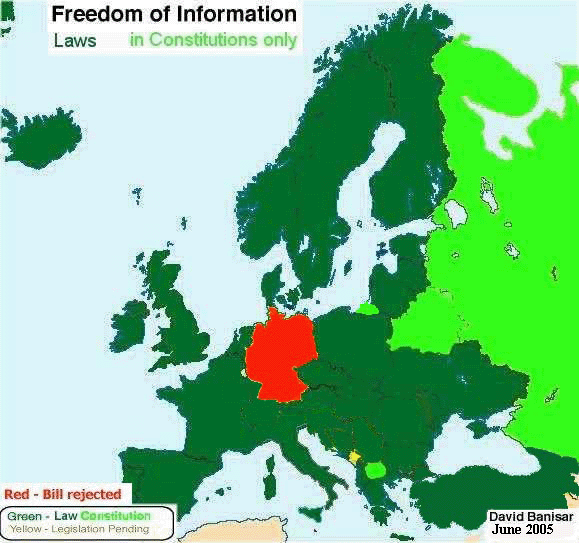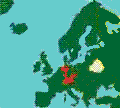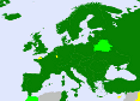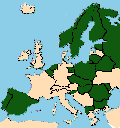Walter Keim
Am Berg 22
D-73553 Alfdorf-Haselbach,
27.12.2001 (updated 9.2.2002)
E-mail: walter.keim@gmail.com
To the
Committee on Petitions
European Parliament
Members' Activities Division
L-2929 LUXEMBOURG
Petition 80/2002: Freedom of Information (FOI) in member
state Germany
This petition is about the Commissions plans for freedom of
information (also called right to know or public access to
official documents or administrative transparency) for member
states. I am a German citizens and my occupation is lecturer.
I agree with the European Ombudsman that "public access is
an essential aspect of transparency which, as I have explained
earlier, is itself an essential part of democracy": (see http://www.ombudsman.europa.eu/speeches/en/2001-06-19.htm#Footnote12).
 European countries both
inside the EU and outside have adopted freedom of information in
constitutions (see link here)
and laws: (see link here). Therefore freedom of information is widely implemented
(see map here
and listings)
also in the EU
Commission, Council
and Parliament
on the basis of the EU
Charter of Fundamental Rights (Art. 42).
European countries both
inside the EU and outside have adopted freedom of information in
constitutions (see link here)
and laws: (see link here). Therefore freedom of information is widely implemented
(see map here
and listings)
also in the EU
Commission, Council
and Parliament
on the basis of the EU
Charter of Fundamental Rights (Art. 42).
In environmental matters freedom of information is
implemented according to a EU directive (Council
Directive 90/313/EEC). This was adapted not 31.
December 1992 but nearly two years too late on 15. July 1994.
German bureaucracy tried to hinder Germans with help of high
costs to use freedom of information. The European commission won
(Case
C-217/97) at the European High Court to achieve that Germans
could benefit from freedom of information in environmental
subjects.
Freedom of information is an
internationally human right promoted by the United Nations.
The report of the UNHCR-Special Rapporteur, Mr. Abid Hussain,
"Promotion and protection of the right to freedom of opinion
and expression", E/CN.4/1998/40
of 28. January 1998, especially Part
III. A. The right to seek and receive information, demands
FOI as a precondition of Freedom of opinion. This is confirmed
and strengthened in E/CN.4/2000/63
part 42. "B. Access to information": FOI "is one
of the rights upon which free and democratic societies
depend". Freedom of information is based on article 19 of the Universal
Declaration of Human Rights: http://www.udhr.org/UDHR/udhr.HTM#19
and Article 19, paragraph 2 of the International
Covenant on Civil and Political Rights (ICCPR) as discussed
here.
Based on a survey on trends of freedom
of information worldwide (ISBN 1 902598 44 X) the organization ARTICLE 19 concludes, that
this right is widely recognized as human right (Freedom
of Information: An Internationally protected Human Right by Toby MENDEL).
In Europe 5 countries are working with FOI pending bills, all the
other countries have FOI in the constitution and/or laws. If 4 of
these countries will approve FOI laws, Germany will be
the only country in Europe without Freedom of information.
Why should EU members be the last countries in Europe giving
freedom of information to people living there?
Personally the need of freedom of
information became clear to me while writing many petitions on patients rights
(see http://wkeim.bplaced.net/petitionen.htm).
Why is it so difficult in Germany to get to know patients rights?
Why is patient
participation lacking? Why are the recommendations on patients
rights of the Council of Europe not translated to German? I
suggested to the German government to start to translate Council
recommendations and publish them. (see: http://wkeim.bplaced.net/files/011223fischer.htm).
Why is there no possibility to complain to independent bodies
(before going to court) to support these rights if they are not
granted? According to the World
Health Report 2000 Germany has the most expensive health
system in the EU, but is on rank 25
among industrial states looking at the quality of services. Patient
rights are a reflection of human rights:
(see: http://wkeim.bplaced.net/files/index-bg/Patients_Frame_all.htm)
I have asked the Commission to send me "Communication
(93) 191" which contains plans to give European citizens
access to official information in member states and EU
institutions and tell me on the progress: http://wkeim.bplaced.net/011226eu.txt.
(9.2.02:
I got the document
which contained the plans, but today the Commission seems to
have no longer plans for member states). It also seems that the
"GREEN PAPER ON PUBLIC SECTOR INFORMATION IN THE INFORMATION
SOCIETY COM(98)585final", adopted on 20 January 1999: http://europa.eu.int/ISPO/docs/policy/docs/COM(98)585/index.html
and "eEurope 2002: Creating a EU Framework for the
Exploitation of Public Sector Information COM(2001)607final" just mentions differences between states and has lower ambitions.
It is called a "key resource for Europe", but what is
the progress? For member states there are possibilities to access
environmental information and EU documents received by member
states. Unfortunately there are no minimum standards for access
of documents of member states.
 The German government has invited
citizens 2001 to discuss a proposal for a law on freedom of
information for Germany. I participated in this discussion.
However I was told that the process of discussions between German ministers to
bring this proposal to parliament may not be finished during this parliamentary
session. Therefore I suggested to the parliament to
give this law anyway by own initiative.
The German government has invited
citizens 2001 to discuss a proposal for a law on freedom of
information for Germany. I participated in this discussion.
However I was told that the process of discussions between German ministers to
bring this proposal to parliament may not be finished during this parliamentary
session. Therefore I suggested to the parliament to
give this law anyway by own initiative.
As a German citizen I complain that Germany has no freedom of
information, a Fundamental
Right of the EU Charter (Art.
42), an essential aspect of democracy (according to the
Ombudsman) and widely accepted human rights (according to ARTICLE
19) and a precondition of Freedom of opinion (according to
UNHCR-Special Rapporteur). Therefore I am discriminated, without
the human right of freedom of information, a "second
class" citizen compared to other EU citizens and people
living in candidate states applying for EU membership. If EU
citizens move to Germany they will lack Freedom of information
for the state where they are living. Germany would have to adopt
freedom of information first if it would want to get goodwill for
a membership application now.
I refer to the "European Parliament resolution on the situation as
regards fundamental rights in the European Union (2000)
(2000/2231(INI))" document A5-0223/2001. Point 3 "Notes that it is the particular
responsibility of the European Parliament (by virtue of the role
conferred on it under the new Article 7(1) of the Treaty of Nice)
and of its appropriate committee to ensure (in cooperation with
the national parliaments and the parliaments of the candidate
countries) that both the EU institutions and the Member States
uphold the rights set out in the various Chapters of the
Charter" and
point 8: "Recommends that the report on respect for
fundamental rights in the EU be incorporated into the warning
mechanism provided for in Articles 6 and 7 of the Treaty on
European Union in accordance with the following principles".
(Added 2.1.2003: This report says:
"With regard to freedom of information and, more
specifically, right of access to documents, the national law of
all 15 Member States includes provisions on access to the files
held by the administration (constitutional provisions,
administrative laws,)." This is wrong: The mentioned
law of "the Land of Brandebourg of 10 March 1998 on access
to documents and information." is only for 1 (Brandenburg)
of 16 Bundesländer and does not apply to national law.)
[Added 11.2.03: The German constitution protects the right to
freedom of expression and information in article 5. Unfortunately
the right to information is limited to "open sources"
("allgemein zugänglichen Quellen"). Therefore the
Constitutional Court (Verfassungsgericht) refused to process a
complaint: http://wkeim.bplaced.net/v-klage_en.htm. The
scientific work of Professor J. Wieland: "Freedom of
information" 28 shows that
the Germany law system is build on the principle of "dominance of official secrecy
(Amtsgeheimnis, which) has its roots in absolutism and
bureaucracy. Absolutism accepts the governor as a father-figure
in the role of a guardian". The highest Court in
Rheinland-Pfalz LG
Mainz (1 QS 25/98) 29
stated that the court can not give access to documents
(as human rights would demand), because it is the parliament,
which would have to give this right. This case is about access to
documents of an accused, but shows that human
rights in Germany need support.]
Germany violated freedom of opinion in the case Vogt
v. Deutschland ( - 7/1994/454/535 - EuGRZ 1995, 590 - ) at
the European Court of Human Rights. Germany
does not respect this and tries to neglect this verdict in
other similar cases. (13. November 2002: Another complaint at the
European
Court of Human Rights was filed. This case is about the right to
give free legal advice, which is forbidden by the law
of legal advice from 1935).
I complain that the Commission and Council failed to give all
Europeans at least a minimum of freedom of information in member
states and ask the European Parliament for support, according to
resolution A5-0223/2001.
This petition is published on the Internet: http://wkeim.bplaced.net/petition_eu.htm.
Sincerely,
Walter Keim
Am Berg 22
D-73553 Alfdorf-Haselbach
E-mail: walter.keim@gmail.com
Support Freedom of Information: http://wkeim.bplaced.net/foil.htm#e-mail
Support Patients' Rights: http://wkeim.bplaced.net/patients.htm#e-mail
Amendments:
Support Freedom of Information by
E-Mail to the European Commission and Council with a copy to the
European Parliament.

 Freedom
of information came 1766 to
Sweden, 1951
to Finland, 1966
to den USA and 1970 to
Norway. In 1981 the Council of Europe gave "Recommendation
No. R (81) 19" on the access to information held by
public authorities. Since then both EU and nearly all countries
in the EU and Europe adopted such laws. However citizen rights in
member states vary and there are no minimum standards. In order
to keep up with the international development freedom of
information should be strengthened in EU member states.
Freedom
of information came 1766 to
Sweden, 1951
to Finland, 1966
to den USA and 1970 to
Norway. In 1981 the Council of Europe gave "Recommendation
No. R (81) 19" on the access to information held by
public authorities. Since then both EU and nearly all countries
in the EU and Europe adopted such laws. However citizen rights in
member states vary and there are no minimum standards. In order
to keep up with the international development freedom of
information should be strengthened in EU member states.
Support Freedom of Information, by
the following E-Mail to the European Commission (click here):
I support the call to the
European Commission and Council for democratic and accountable
Freedom of Information laws on access to public documents in EU
and member states.
(You may change the text according to your needs).
Thanks to all who have given comments and contributed to improve
this petition. Please do not hesitate to mail
me if you have comments.
Please feel free to link this site!
Visitor No.  since 27. December 2001
since 27. December 2001
[Petitions] [Back to page on FOI]
[Back to Homepage]
Foi in Europe:

 European countries both
inside the EU and outside have adopted freedom of information in
constitutions (see link here)
and laws: (see link here). Therefore freedom of information is widely implemented
(see map here
and listings)
also in the EU
Commission, Council
and Parliament
on the basis of the EU
Charter of Fundamental Rights (Art. 42).
European countries both
inside the EU and outside have adopted freedom of information in
constitutions (see link here)
and laws: (see link here). Therefore freedom of information is widely implemented
(see map here
and listings)
also in the EU
Commission, Council
and Parliament
on the basis of the EU
Charter of Fundamental Rights (Art. 42). 

